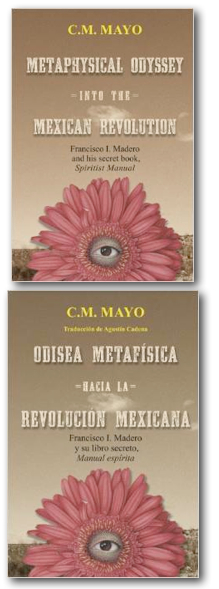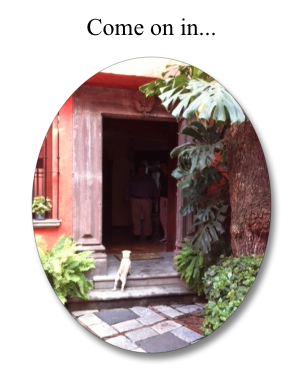|
APRIL
2015
Dear
Subscribers,
 An April shower
of cyber lotus petals upon you! This past couple of months, my
writing assistants, U. Quetzalpugtl, and his little sister, W.
Quetzalpugalotl, have been keeping me busy with all sorts of
fantastical things, mainly walks. In between, I've managed to
work on reading about Far West Texas, blogging about Far West
Texas and yonder, and churn out a number of podcast transcripts. An April shower
of cyber lotus petals upon you! This past couple of months, my
writing assistants, U. Quetzalpugtl, and his little sister, W.
Quetzalpugalotl, have been keeping me busy with all sorts of
fantastical things, mainly walks. In between, I've managed to
work on reading about Far West Texas, blogging about Far West
Texas and yonder, and churn out a number of podcast transcripts.
In
this newsletter:
oodles
of new podcast transcripts, a literary travel writing workshop,
more about the new book, Metaphysical
Odyssey into the Mexican Revolution and its Spanish translation,
plus the best from the blog, "Madam Mayo."
PODCAST
TRANSCRIPTS
 The
Marfa Mondays Podcasting Project, exploring Marfa, Texas and
the greater Big Bend region, continues at a renewed chug-along pace.
A crunchy interview with Texas historian Lonn Taylor has been
recorded in Fort Davis, but I'm still ironing out the edits.
In the meantime, I've been preparing the transcripts of previous
podcasts. The
Marfa Mondays Podcasting Project, exploring Marfa, Texas and
the greater Big Bend region, continues at a renewed chug-along pace.
A crunchy interview with Texas historian Lonn Taylor has been
recorded in Fort Davis, but I'm still ironing out the edits.
In the meantime, I've been preparing the transcripts of previous
podcasts.
Transcripts available to date:
Tremendous Forms:
Paul V. Chaplo on Finding Composition on the Landscape
Podomatic
+ iTunes
+ Transcript
"on
list of the world's largest super volcanoes, the Chinati caldera
is near the top of the list, and when the Chinati erupted about
32 million years ago, the force of the eruption was greater than
Vesuvius and greater than Krakatoa. To think that that happened
just southwest of Marfa is mindboggling...." [READ
MORE]
Gifts
of the Ancient Ones:
Greg Williams on the Rock Art of the Lower Pecos Canyonlands
Podomatic +
iTunes +
Transcript
"When
I drive out here from San Antonio… I love rock and roll.
I love old rock and roll music, it's playing all the way. When
I hit the Pecos River, I turn the music off and I usually roll
the windows down. I don't care how hot it is. I turn the air
conditioner off and I usually drive way under the speed limit
and then I become… at that point it's not about me. At that
point I become the smallest thing here and everything out there
is bigger than me, everything out there has something to teach
me or to show me..." [READ
MORE]
Looking
at Mexico in New Ways:
An Interview with Historian John Tutino
Podomatic
+ iTunes
+ Transcript
"I
got to the point where I said, "The whole basic big picture
of where we thought Mexico fit in the world is somewhere between
wrong and mythical." And you can't change that by chipping
away at the edges and saying, "look at this little piece." [READ MORE]
Dallas
Baxter: "This Precious Place"
Podomatic
+ iTunes
+ Transcript
"I
really love this place out here, and I love the way it looks.
I like the way it smells. I like to go outside at night and just
look at the sky and feel the wind, and I think it's a really
precious place, and I think it's a precious place because of
what has come before and because of what's here now." [READ MORE]
Cowboy
Songs by Cowboys and an Interview with Michael Stevens
Podomatic
+ iTunes
+ Transcript
"They
love the job they do. They love their animals. They appreciate
the land. Have you driven around the country and seen cowboy
churches? Have you ever seen a farmer church? I never saw anybody
sing about their tractor! You know, the sailors sing about their
ships, but the cowboys, they love that." [READ MORE]

Listen in anytime to all my podcasts on podomatic
or iTunes.
 Plus, two new
transcripts for the Conversations with Other
Writers
occasional series: Plus, two new
transcripts for the Conversations with Other
Writers
occasional series:
Mexican
writer and editor Rose Mary Salum:
Marking Connections with Literature and Art
Show
Notes
+ Podomatic +
iTunes +
Transcript
(APPROX
42 MINUTES)
"While
I was studying my master's degree and while I was taking my literature
classes, I remember and it was one of the moments also that made
me start the magazine, while we were studying the Latin American
literature. We were studying people from the boom. Vargas Llosa,
Gabriel García Márquez, and they didn't even go
to Octavio Paz, for example. I mean they stopped at the boom.
Like, after the boom nobody was writing anything. You know, I
remember asking one of the professors, is this all we are studying?
Aren't we reading the contemporary writers? She said, "No."
And I mean, this is it. I was really shocked by that..." [READ
MORE]
Novelist and Essayist Sergio Troncoso,
Author of This Wicked Patch of Dust and Crossing Borders
Show
Notes
+ Podomatic +
iTunes
+ Transcript
(APPROX
1 HOUR)
"I'm
writing stories. I just finished a story on a Mexican-American
in Iraq. I interviewed Marines to understand their life in Iraq.
You know, what is the smell of the desert like in Iraq that's
different from the smell of the desert in El Paso? The sand has
a different consistency in Iraq than it does in El Paso. It's
not the same kind of sand. It's more of a clay sand. These incredible,
riveting stories. One of the largest segments of the military
are these Latino soldiers that rarely get any kind of press,
and what's going on in their minds... [READ MORE]
UPCOMING
WORKSHOP
April
18, 2015 Bethesda
MD
 (Saturday,
one day only) (Saturday,
one day only)
The
Writer's Center
10
am - 1 pm
Literary Travel Writing
Take
your travel writing to another level: the literary, which is
to say, giving the reader the novelistic experience of actually
traveling there with you. For both beginning and advanced writers,
this workshop covers the techniques from fiction and poetry that
you can apply to this specialized form of creative nonfiction
for deliciously vivid effects.
 More
information and to register on-line More
information and to register on-line
 THE BEST FROM
THE THE BEST FROM
THE
"MADAM
MAYO"
BLOG
  What
Happened to Thelma: A Story of the Far Future by C.M. Mayo What
Happened to Thelma: A Story of the Far Future by C.M. Mayo
 Sarah Cortez, ed. Goodbye, Mexico:
Poems of Remembrance (which includes my translation of a
poem by Agustín Cadena) Sarah Cortez, ed. Goodbye, Mexico:
Poems of Remembrance (which includes my translation of a
poem by Agustín Cadena)
 Amanda Palmer's The Art of Asking:
A Beyond Glowing Review Amanda Palmer's The Art of Asking:
A Beyond Glowing Review
 Cyberflanerie:
Rock, Mural, Street and Bathroom Wall Edition d'Not Art Cyberflanerie:
Rock, Mural, Street and Bathroom Wall Edition d'Not Art
 Ignacio Solares' short story "Victoriano's
Deliriums" Translated by Yours Truly in the Lampeter
Review Ignacio Solares' short story "Victoriano's
Deliriums" Translated by Yours Truly in the Lampeter
Review
 A
Shout-out for the Authors Guild A
Shout-out for the Authors Guild
 The
StandStand: One Highly Recommended Way to Keep on Writing While
Standing The
StandStand: One Highly Recommended Way to Keep on Writing While
Standing
 Lone Star Nation: How Texas Will Transform
America by Richard Parker Lone Star Nation: How Texas Will Transform
America by Richard Parker
Some
felicitous recycling going on:
 Literary translator Lisa
Carter's excellent Intralingo newsletter featured my blog post,
"It's
Not Like Making a Peanut Butter-and-Jelly Sandwich but It's Not
Rocket Science Either or, How I Made my PODs (And You Can, Too)"
and Mexico-based
editor Mikel Miller's also excellent Egret
Books newsletter
featured by blog post, my talk for the Associated Writers Association
Conference of 2014, "Writers'
Blogs: Eight Reflections After 8 Years of Blogging". Literary translator Lisa
Carter's excellent Intralingo newsletter featured my blog post,
"It's
Not Like Making a Peanut Butter-and-Jelly Sandwich but It's Not
Rocket Science Either or, How I Made my PODs (And You Can, Too)"
and Mexico-based
editor Mikel Miller's also excellent Egret
Books newsletter
featured by blog post, my talk for the Associated Writers Association
Conference of 2014, "Writers'
Blogs: Eight Reflections After 8 Years of Blogging".
 Interested
in posting one of these or any other of my blog posts on your
blog or newsletter? Ask me! I'll
probably say yes. Interested
in posting one of these or any other of my blog posts on your
blog or newsletter? Ask me! I'll
probably say yes.
 NEWS ABOUT
THE NEW BOOK NEWS ABOUT
THE NEW BOOK
 In case you're new to
this newsletter, my latest book is Metaphysical
Odyssey into the Mexican Revolution: Francisco I. Madero and
His Secret Book, Spiritist Manual. It's available on Kindle
and in paperback,
it's gotten some great
reviews,
and I have presented it at Rice University, the UCSD Center for
US-Mexico Studies and, most recently, at Stanford Unversity's
Center for Latin American Studies. I invite you to visit the
website for this book, which offers excerpts, articles, reviews,
Q & A, resources for researchers, podcasts and links to order,
here. In case you're new to
this newsletter, my latest book is Metaphysical
Odyssey into the Mexican Revolution: Francisco I. Madero and
His Secret Book, Spiritist Manual. It's available on Kindle
and in paperback,
it's gotten some great
reviews,
and I have presented it at Rice University, the UCSD Center for
US-Mexico Studies and, most recently, at Stanford Unversity's
Center for Latin American Studies. I invite you to visit the
website for this book, which offers excerpts, articles, reviews,
Q & A, resources for researchers, podcasts and links to order,
here.
 The Spanish translation
by Mexican poet and novelist Agustín Cadena, with the
title Odisea
metafísica hacia la Revolución Mexicana: Francisco
I. Madero y su libro secreto, Manual espírita, has been doing well
in Mexico. Most recently, it was presented at the Centro de Estudios
de la Historia de México—home
of Madero's personal library—
with historians Javier Garciadiego,
Manuel Guerra de Luna, Luis Cerda and Yolia Tortolero Cervantes,
and in Querétaro, with Araceli Ardón, Dra Lucia
Beltrán, Dr Andrés Garrido del Toral, the cronista
de la ciudad, and historian Dra Guadalupe Zárate. Yes,
it will be presented at the Feria de Libros in Guadalara this
December. Stay tuned for details. Please be sure to send me an
email or Twitter @cmmayo1
if you will be attending the FIL. The Spanish translation
by Mexican poet and novelist Agustín Cadena, with the
title Odisea
metafísica hacia la Revolución Mexicana: Francisco
I. Madero y su libro secreto, Manual espírita, has been doing well
in Mexico. Most recently, it was presented at the Centro de Estudios
de la Historia de México—home
of Madero's personal library—
with historians Javier Garciadiego,
Manuel Guerra de Luna, Luis Cerda and Yolia Tortolero Cervantes,
and in Querétaro, with Araceli Ardón, Dra Lucia
Beltrán, Dr Andrés Garrido del Toral, the cronista
de la ciudad, and historian Dra Guadalupe Zárate. Yes,
it will be presented at the Feria de Libros in Guadalara this
December. Stay tuned for details. Please be sure to send me an
email or Twitter @cmmayo1
if you will be attending the FIL.
More podcasts to come. This book is available from Literal Publishing
in the US and in Mexico, and from Dancng Chiva in Kindle and
paperback outside of Mexico.Visit this book's website here.
 Article
in Spanish in Milenio 3-8-2015 Article
in Spanish in Milenio 3-8-2015
"Los espíritus de Francisco I. Madero"
por Vianey Fernández
Review in La Jornada
¨Mayo y el espiritismo de Francisco I. Madero: Sin maniqueísmos"
por Andrew Paxman
Philip
Garrison, author
of The Permit That Never Expires and Because I Don't
Have Wings, reviews Metaphysical Odyssey into the Mexican
Revolution:
|
One look at the subtitle—
Francisco I. Madero and his Secret Book, Spiritist Manual—
is enough to tell you her work is both demanding and ambitious.
It is demanding in part because it begins by summarizing a century
of fine-print esoteric thinking in little more than 100 pages.
It is ambitious because of its goal: it wants to change our
most basic thinking about the Mexican Revolution.
Her narrative involves
three different perspectives. One begins in upstate New York,
in the mid-1800's, in an area just south of Rochester, stretching
from Albany to Buffalo. To this day people call it the Burned-over
District for the various kinds of fervor that have seized it.
In the 1840's, weird phenomena, occurring in very ordinary cottages,
began to attract national attention. Loud rapping noises were
heard, tables levitated, shapes materialized, until— through
the midwifery of Madame Blavatsky and like enthusiasts—
the discipline of Spiritualism was born. The Burned-over District
was also the epicenter of agitation for abolition, women's rights,
and various utopian social movements, the longest lived of which,
it turns out, has been the Church of Jesus Christ of the Latter
Day Saints. But the tenets of Spiritualism—under different
aliases—have had effects we're only beginning to recognize.
Another perspective begins around 1909, when Francisco I. Madero—
first Mexican president after the Revolution —published
his famous The Presidential Succession, as well as the
much less well known Spiritist Manual. Record crowds turned
out to greet his triumphal march through the countryside to the
Capital. By February, 1913, with hundreds of civilians dead in
the Capital streets, he is deposed and assassinated— by
a traitorous Mexican general...
A third perspective begins around 2005 when Mayo, researching
her novel, The Last Prince of the Mexican Empire,
gained access to Madero's complete library, including a copy
of Spiritist Manual. On learning the latter had never
been translated, she decided to do so. Four years of background
reading immersed her in hundreds of Madero's own volumes, as
well as a presidential correspondence so endless that, at one
point, her economist husband's appointment to a cabinet position
in the Felipe Calderon government must have made it seem that
life was imitating art! Her reading left her with one conclusion:
neither Madero nor the Revolution itself can be understood
apart from the psychic landscape that yielded them.
In one sense, we all agree. There's something about the Mexican
Revolution that dodges quantification. Its importance— to
those who lived through it, or to those of us who re-live it—
simply won't break down into discrete and measurable units. It
was riddled with friendships and hatreds, of course— maybe
more than its Russian counterpart, or maybe we only remember
it that way— but the large and contradictory personalities
we recall won't resolve into ideology, into figure and ground,
into PowerPoint outlines.
Mexican history, at a great distance— from way too far off
to yield any observation useful for living in it, of course!—
appears a tug of war between two antagonistic forces. Call them,
for the moment, the Spiritists of Madero and the Cientificos
of don Porfirio. Or, say the struggle is between an inclusive
dualism and a rigorous positivism. Or between a patient devotion
to different qualities of experience and a grim fundamentalist
faith that only the quantifiable is real. ... Mayo's large
contribution in this book is to remind us of what we way too
easily forget. Francisco Madero was a countryman of El Niño
Fidencio, of Teresa Urrea, aka La Santa de Cabora. He was born
in a land of faith-healers and desert saints, into a belief system
built on four millennia of shamanism. For that matter, lack of
evidence notwithstanding, he even may have shared a trait or
two with Anacleto Morones, Juan Rulfo's lecherous mountebank.
The point is that history has all too often portrayed him
as a dreamy, impractical idealist—a naïf too innocent
to survive a pair of cynical drunks like Huerta and Wilson. That
judgement itself, Mayo implies, tends to be a product of the
positivist thinking which Diaz introduced, and which, alas, has
survived Madero, and changed his Revolution.
Francisco I. Madero was no wuss. His most fundamental beliefs
tilted toward trust and not suspicion, connectedness rather than
separation. Nothing he ever wrote, kindly remember, brought him
more ridicule than his suggesting that —under supervised
conditions— the living might even communicate with the dead.
Mexicans communicating with the dead! Imagine that!
— PHILIP GARRISON

|
 NEW ON THE
WEBPAGE WWW.CMMAYO.COM NEW ON THE
WEBPAGE WWW.CMMAYO.COM
 For
MEXICOPHILES: Updates on the Recommended
Books on Mexico
page. For
MEXICOPHILES: Updates on the Recommended
Books on Mexico
page.
 For
CREATIVE
WRITERS:
Updates on the Resources
for Writers
page and the Recommended
Reading on Creative Process
page. For
CREATIVE
WRITERS:
Updates on the Resources
for Writers
page and the Recommended
Reading on Creative Process
page.
 On Marfa Mondays, as mentioned up top, many new transcripts. On Marfa Mondays, as mentioned up top, many new transcripts.
All
good wishes to you,
C.M.
MAYO
|







 (Saturday,
one day only)
(Saturday,
one day only)



 Article
in Spanish in Milenio 3-8-2015
Article
in Spanish in Milenio 3-8-2015